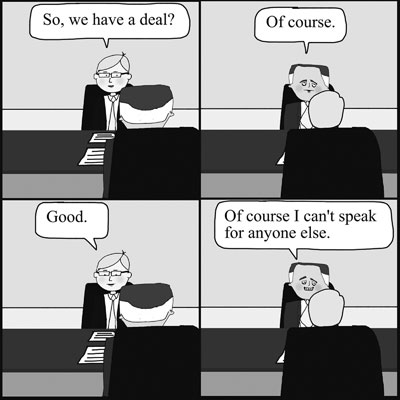Over 30 years of anarchist writing from Ireland listed under hundreds of topics
Public Sector Deal or No Deal – It’s a Scrap Either Way

The long days and nights of bargaining between government and union top brass at Croke Park ended when the participants emerged and presented the fruits of their deliberations. It is a pretty awful deal, which rubber stamped the pay cuts already handed out to public sector workers and added a whole layer of new working conditions, essentially extra hours and responsibilities for the same or lower pay. Over the couple of weeks that followed, the various public sector unions in conference or at executive level recommended either accepting or rejecting this deal, with the final call resting with the membership. As we go to print the final result of these ballots are still unknown but recent experience should warn us that, in either case, the battle is far from over.
This government is pursuing an agenda whereby the economic crisis must be solved by an assault on social services and workers pay. The savings garnered from these attacks are trifling when compared to the tens of billions handed to crooked banks and defaulting property developers but it seems that it sends the right message to international investors, the IMF and Brussels. A government addicted to taking and then taking again can never be trusted to abide by an agreement, especially when they're across the table from union bureaucrats desperately clinging to their place at that government table.
Either way, they will be back demanding more cuts and more pain and this will only stop when the union membership finally stand their ground and push back hard. It’s never too soon to get in the habit of fighting back. Strong, united industrial action would not only end the cycle of pay cuts but would also be of enormous value in learning how to stick together, strike back and win victories as workers. An all-out strike, supported where possible by semi-state and other non-public sector workers, can quickly resolve this issue, where 18 months of talks and ‘deals’ has only led us deeper and deeper into trouble.

